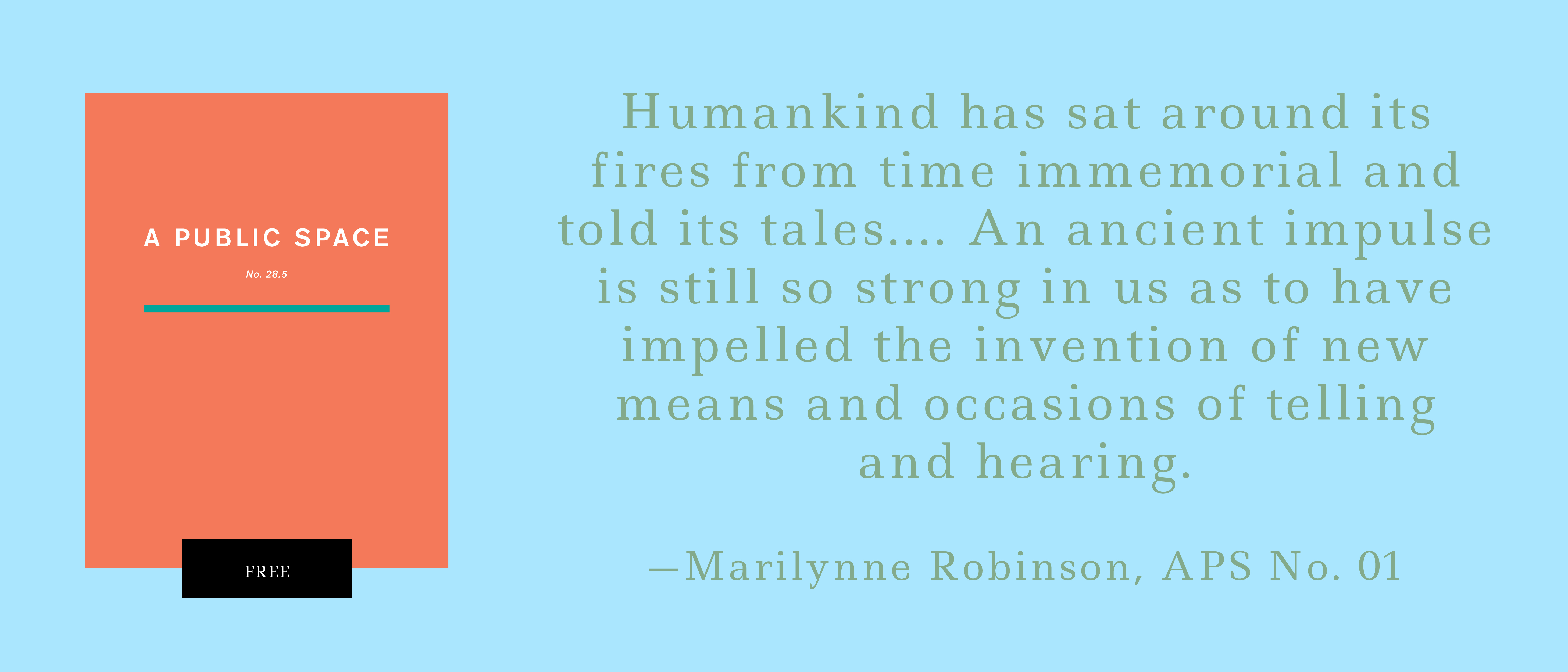News
Magazine
"Mona’s business will be unfinished for a long time. In this story and maybe the next, she won't find resolution." —Sarah Blakley-Cartwright
February 2, 2022 by Sarah Blakley-Cartwright
Magazine
"In the Mi Jin Kim universe, morality is frighteningly relative, and I like “Pocket Money” as preliminary instructions for reading her work." —Laura Preston
February 2, 2022 byLaura Preston
Magazine
"I admit I have the blessing and the curse of being an extremely literal reader, but Kiik’s work overwrites those parts of my senses that are too much to-the-letter—his work helps me deviate, which is to say, it makes me a better reader and editor." —Megan Cummins
February 2, 2022 by Megan Cummins
Magazine

A Public Space No. 28.5 is a collection of free-access pieces from the magazine's archive, a kind of in-between issue for an in-between time.
May 28, 2020
Magazine
"What would happen if the natural world could strike back?" —Taylor Michael
May 28, 2020
Magazine
"I’ve always been obsessed with stories about failure — myths, folklore, epics, and tragedies —and how these genres think about the fall of man. Is it our choices, chance, or fate that leads us to our lowest points? Just how does this really happen?" —Taylor Michael
May 28, 2020
Magazine
"I’m deeply suspicious of the idea that people or characters can suddenly undergo deep and genuine change, or that radical change and true epiphanies are common, but I am completely faithful to the idea that there are moments when we can be profoundly shaken." —Jamel Brinkley
May 27, 2020
Magazine
"[She writes] in the contagious kind of way that should renew anyone's love of language." —Jon McGregor
May 6, 2020
Magazine
“Journey Along the Sea Road” was written in the thirteenth century by an unknown Buddhist monk. In these journals, published in A Public Space No. 26, a nameless traveler charts a course along the Tōkiadō—the great road linking Kyoto to Edo (now Tokyo)—and launches a new genre along the way: the literary travel journal.
April 29, 2020
Magazine
"Some writers keep impersonal offices elsewhere. I work right where I live. Every surface seems my next novel’s table of contents. Being a visual glutton, I want to love everything I see. And this form of happiness is manageable." —Allan Gurganus
April 22, 2020
Magazine
A story of two friends, Bunnatine and Biscuit, "Origin Story" takes place at an abandoned theme park, the Land of Oz—in a world of parallel universes and superhero origin stories; nemeses and levitating waitresses and tabloid reporters.
April 15, 2020
Magazine
To read a Dorthe Nors story is to enter a dream and become subject to its logic.
October 22, 2014 by Daniel Woodrell
Magazine
I'll read any poem about a machine.
September 15, 2014 by Patricia Lockwood
Magazine
All through my twenties I sat immersed in Kerstin Ekman’s novels. I believe she taught me to write.
May 2, 2014 by The Work of Kerstin Ekman | Selected and Introduced by Dorthe Nors
Magazine
May we talk about poetry and magic? Or is it passé? I have a feeling it is passé. But still I hear poets say, “I don’t choose the form. The poem chooses the form,” or “The poem speaks to me.” They say these things flatly[...]
April 1, 2014 by Jillian Weise
Magazine
Do we need to make a case for fiction, you might ask. Especially if you write fiction, there may be no question, to you. But in my experience, for most of our fellow citizens, what we do is invisible, unimaginable. “I couldn’t do it,” so many people tell me. And if it is invisible and unimaginable, it is also, I’m afraid, indefensible.
November 25, 2013 by Alexander Chee
Magazine
Aaron Crippen's translations of Du Fu's poems appeared in Issue 17.
For a poet, there must be no greater pleasure than reading classical Chinese. For a translator, there may be no greater challenge than translating it. For Chinese writing is unique, with its pictographic roots. Fundamentally, its words do not denote sounds, as in alphabetic languages, but objects—such as 日, the sun—or combinations of objects to express ideas—such as 明, the sun and crescent moon together, meaning “bright” or “clear.” Its curves have been straightened and standardized, but in 日 we still recognize what was once a circle, like the sun, with a dot at its center.
November 4, 2013 by Aaron Crippen
Magazine
This article originally appeared on August 17, 2009.
Years ago, I became fascinated with a hotel in Portland, Maine, though I’m not sure why. The Inn at St. John is a basic hotel near the bus station, not gritty enough to explain my fascination. I’ve never been in, but pictures on the website show velvet curtains and furniture that’s meant to look Victorian. Quotes promise that it’s "comfortable and a good value" and “CLEAN!” It offers three room tiers: pet-friendly rooms, economically priced rooms for extended visits, or romantic luxury accommodations for weekend getaways. If you want any of these things, it says, the hotel is exactly what you’re looking for.
October 1, 2013 by Sara Majka